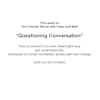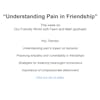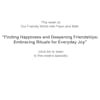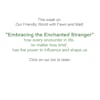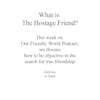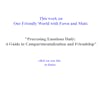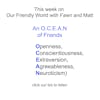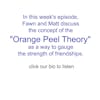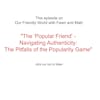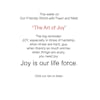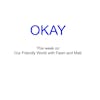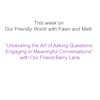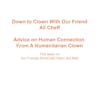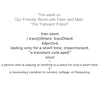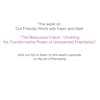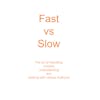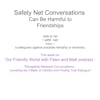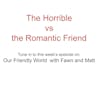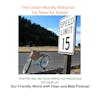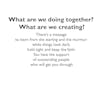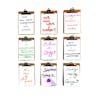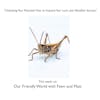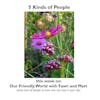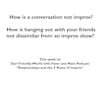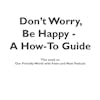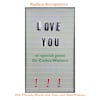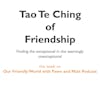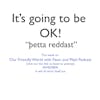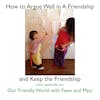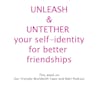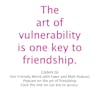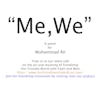
Understanding Pain in Friendship

In this week's episode, Fawn and Matt delve into the intricacies of friendship amidst pain. Fawn opens up about her recent struggles, highlighting how pain, whether physical, emotional, or spiritual, can deeply influence our interactions with others. Drawing parallels between pain and behavior, they explore how pain manifests in subtle cues like body language and tone of voice, affecting our relationships. Reflecting on personal experiences, they emphasize the importance of empathy and vulnerability in fostering meaningful connections. Offering practical insights, they discuss strategies for navigating friendships with grace and understanding, encouraging viewers to adopt a perspective of compassionate detachment. Through candid dialogue and heartfelt anecdotes, Fawn and Matt illuminate the complexities of human connection, inviting listeners to embrace empathy and kindness in their interactions.
Key Themes:
Understanding pain's impact on behavior
Practicing empathy and vulnerability in friendships
Strategies for fostering meaningful connections
Importance of compassionate detachment
#Friendship, #Pain, #Empathy, #Vulnerability, #HumanConnection, #Relationships, #CompassionateDetachment, #Emotional Resilience, #MeaningfulConnections, #Understanding Behavior, #FriendshipDynamics, #InterpersonalCommunication, #SupportiveRelationships, #NavigatingFriendshipChallenges, #BuildingTrust

In this week's episode, Fawn and Matt delve into the intricacies of friendship amidst pain. Fawn opens up about her recent struggles, highlighting how pain, whether physical, emotional, or spiritual, can deeply influence our interactions with others. Drawing parallels between pain and behavior, they explore how pain manifests in subtle cues like body language and tone of voice, affecting our relationships. Reflecting on personal experiences, they emphasize the importance of empathy and vulnerability in fostering meaningful connections. Offering practical insights, they discuss strategies for navigating friendships with grace and understanding, encouraging viewers to adopt a perspective of compassionate detachment. Through candid dialogue and heartfelt anecdotes, Fawn and Matt illuminate the complexities of human connection, inviting listeners to embrace empathy and kindness in their interactions.
Key Themes:
-
Understanding pain's impact on behavior
-
Practicing empathy and vulnerability in friendships
-
Strategies for fostering meaningful connections
-
Importance of compassionate detachment
#Friendship, #Pain, #Empathy, #Vulnerability, #HumanConnection, #Relationships, #CompassionateDetachment, #Emotional Resilience, #MeaningfulConnections, #Understanding Behavior, #FriendshipDynamics, #InterpersonalCommunication, #SupportiveRelationships, #NavigatingFriendshipChallenges, #BuildingTrust
Fawn: [00:00:00] Welcome back to our friendly world, everybody. Hello. Oftentimes, when we meet people, people we don't know, or people we do know, there could be something on their face, or their gestures, or their body, language, that will turn us off. Oh dear. And then from there, so many things can happen. We take things personally, which in some cases, They're absolutely personal targets headed , at us, right?
But most the time, I think, people are in pain. It could be physical pain, emotional pain, spiritual pain that can result in the furling of eyebrows or maybe like a, a snarl or being short with someone, you know? Not having enough patience, the tone of voice, all of that. Comes from pain. I mean, if you think about it, when people are so [00:01:00] happy, let's say someone doesn't have any physical pain and they won the lottery, chances are, are they still going to be, like, hateful towards people that are in front of them?
They'll be, like, smiling and looking like they just Jumped off of, like, parachuted out of an airplane for fun, you know what I'm saying? Right? They're not gonna have an evil glare or, talk to you about the mishaps of the world. Because their world is so happy and carefree. But when you add pain in there, sometimes the pain can be a tiny little thorn.
Tiny, tiny. You don't even know it's there, like a little paper cut or, or a, what do you call it, like a splinter, is what I was thinking of. You don't know. And I think these days especially, there's so much of it, there's so many splinters and, and boulders and huge things. So we have to keep in mind, when it comes to friendship especially, uh, relationships in general, that most people are in pain.[00:02:00]
And not to take things personally, and yeah that comes up because I've been in pain for a few weeks now so it's like um yeah, like I've been short with you this morning and then if I'm not short then Nothing looks good to me. You know, the world doesn't look good to you you know, you just feel like everything is Bad.
Because you can't see your way out of your situation. Often times that is true. Even if you have wonderful things happening at the same time, which I do. Absolutely. It's weird because wonderful, wonderful, wonderful things happen, and then I got a bunch of physical, mishaps. So it's just, it's wild.
How do you, maneuver life and keep a positive attitude? It's weird. How can you still, be with friends, or make friends, or present some grace to the [00:03:00] world even if you're not feeling graceful yourself? So, for example, I was meeting with, Leisa from the VoiceOver Network. I was going through auditions, and then I'm like, oh no, it's 9 o'clock, I have a meeting with Lisa.
And then technology got screwed up, and then the meeting got pushed until 10 o'clock. And I was still sitting in my booth. I've had, I, I threw out my back, you guys, like, a couple weeks ago. And so, sitting in a vocal booth, I tend to be in there for four hours at a stretch. And, so I had to sit and not acknowledge the pain, right?
Right. Right. And so, Lisa comes on, Lisa's so beautiful and so sweet and lovely, positive, but as soon as she came on, I, I knew I had to explain to her, because because one, I didn't want her to think that because the meeting was running late that I was upset, so I immediately just became even more vulnerable, and I said, look, if you sense [00:04:00] anything from me, it's not because of the meeting.
I've been in a lot of pain. My back is out. And then I immediately start crying.
MATT: Which is what you do sometimes.
Fawn: I do it when someone offers genuine sympathy. Like, and compassion. All of a sudden it just makes me cry.
MATT: Right, and Ricky Gervais went through the exact same thing in his TV series about how he was falling down when his wife passes away.
It's like, I can deal with people being mean to me, it's when they're nice to me, I can't take it.
Fawn: Right, I was going to say, do you think that's why people avoid nice situations? When they're in pain? Because they want to pull it together and not seem like a sloppy mess. Crying. Right. Which to me, the other way is a sloppy mess.
When you feel like you have it pulled together, but people sense something is wrong, and it has this crazy vibe about you, I feel like [00:05:00] that's the sloppy right there.
MATT: Well, people don't like being vulnerable. Being vulnerable makes people uncomfortable, and it makes everybody uncomfortable, but guess what?
The more vulnerable you are, the more you give an opportunity for the world to delight you.
Fawn: I also think of it as, when you are vulnerable You pose no threat. So, when you're strong and have a wall up like that, to pull everything together, that, I think, produces an energy where someone who's in front of you, , it could seem like conflict for them.
Like combat. They feel like something is wrong, it's me. They're obviously not liking me, or they're out to get me, or, do you know what I'm saying? It comes off as, what's the word I'm looking for? It comes off as, , combative.
MATT: Confrontational is where I was going to
Fawn: go, but yes. Confrontational, yeah.
So, when I'm [00:06:00] vulnerable, I'm just letting you know, hey, I, I mean no harm, I, I, absolutely not, I'm not, I'm experiencing this. So, they know that it's not them. Right. And I know I'm strong enough, despite the blown out back, I know I'm strong enough to handle if someone chooses to look at me like I'm lesser than them.
Do you know what I'm saying? Mm hmm. And I'm not saying that that's what happened with Lisa, but I have had some friends who will take vulnerability as weakness and that lets me know that's not a friend in my
MATT: circle. Right. Okay. Right. Right. And, and that's why , I can appreciate in moments. Not to diminish what you're going through at all, but I can, I can, it's like self deprecating when people have self deprecating humor and it's genuine.
It's always about authenticity. But genuine and they're not trying to boast or brag or any of the rest of that kind of stuff now at the [00:07:00] oscars Oh that feels saccharine and that doesn't feel good.
Fawn: Matt, I disagree. I Okay respectfully What did you call it? Self deprecating? Yes, you called it self deprecating humor.
I do not like that. Not one iota, not one ounce, not one milliliter, not one little tiny nano fraction. No, self deprecating humor is so different than being vulnerable. You're right, it is. Self deprecating humor is, you know what? I'm going to say messed up things about myself before you do. I'm just going to catch you before you tell me, obviously, these things
MATT: about myself.
For me, it's practice. It can be practice on some level. Just for when somebody does choose to light you up. It helps me explore my inner Popeye, frankly.
Fawn: I don't like ever putting yourself down. Okay. You are a magnificent, everyone is a magnificent [00:08:00] light being. And I think it's a disgrace to put yourself down.
I do. What? Ouch.
MATT: Ooh, sting. What
Fawn: do you mean? I'm
MATT: not stinging. You said I'm a
Fawn: disgrace. I said it is a disgrace. You see? You see? You see how you take things personally? Ooh, that's a deep cut. Stop it. I said it is a disgrace. If you constantly put yourself Constantly, yes. No, no, no, no, no, no. Forget constant.
That's not what I wanted to say. If you use deprecating language, self deprecating language, or any kind of deprecating language, I think that is a disgrace. Not that you're a disgrace. I'm saying the opposite. Ugh. I'm saying you are a child of God, you are people, everyone, everyone, all animals, plants, are sentient beings.
Okay? I believe everyone is uh, the divine. And for you [00:09:00] to destroy yourself and, what's the word when you um, I was trying to think of the word this morning. You For a future show coming up. What's the word when you take someone's name through the mud? Denigrate? Was it denigrate? Yeah, you should never do that.
I think that is a disgrace. Not you. See,
MATT: much like my concept of an onion where my true self is all the way down down deep in the middle of this onion. There's 25 Layers I'm feeling very gesticular today.
Fawn: You should be careful. Do you do that on zoom meetings? Oh my god
MATT: But I do play with my rubik's cube and I have to wonder what people see and don't see but anyways, um
Fawn: I'm, sorry, but matt just stuck his He was making like a gesture where you put your palms together like very spiritual and then he stuck his [00:10:00] ear never mind. Okay, go ahead.
MATT: What is that? You'd have to be here, folks. Anyways, no, it's about way on the outer limits of the onion. It's not about being, it's not about the core. It's not about my core beliefs. But , it's about poking fun at something foolish. Like, let's say you like a sports team who doesn't do very well.
Or it's like when you put a wager on a team and you are unsuccessful frequently. It's mocking that kind of stuff. It's not mocking my Inherent skill to do such and such or you know some physical attribute I have it's not about mocking that It's about mocking Things that are a heck of a lot less
Fawn: important, but what do you say Matt, all the time?
It's a slippery slope It
MATT: is a slippery slope, but there are certain lines you can
Fawn: hold Okay. Well, getting back to pain. Yes. Oh, yes. So how do [00:11:00] we, knowing that, knowing that most of people are in pain and we're in pain,
I think the key to having a friendlier society and knowing this information about pain is that
you need to look at things in unattached way. Nothing is about you. So, I say this so many times, you guys, but I think one of the keys to being a friendly person is to look at whoever you're in front of. Someone you're married to, your kids, your best friend, your not friend, the one you want to be friends with.
Your not friend. Whatever. People in general that are in front of you. Look at them like you're watching a movie but not the way Matt watches a movie Matt will analyze every little detail and Tell you what's gonna happen next. So no the way I I would watch a movie is I Just go blank. I'm just like, what are you?
What is this movie? Portraying what what are they saying? It's just a movie. I'm not gonna figure it [00:12:00] out. Just watch it And I'm not saying watch it like be careful. I'm saying just Just, um, view it, And I think that when you do that, it creates a sense of no obligation, a sense of loving detachment. So you are able to see signs you never saw before because you're not so emotionally wrapped up in it.
So if you step back a little bit and watch it like it's a movie and not Take everything personally, you're able to see a gesture, a twinge that you know Oh, that twinge is from a pain, the way they're walking or the way they're sitting. Maybe their back is out or maybe they're experiencing some major stress Did this person have this
before I came along. For example, when I was a kid, back in the day, you pick up the phone, you have no idea who's on the other end. Right? Right. And so one day I was so mad. [00:13:00] And I picked up the phone and I said, HELLO! Very nice. And it just so happened it was a friend of mine who was calling. So she just heard that hello, and immediately there was a fight.
Click. No, she didn't hang up. But she's like, what is your problem? And then we got into a fight. And then I brought it back around and said, I'm so sorry. I picked up the phone in an angry way. I didn't know it was you calling you guys This was back in the day with the it was actually a rotary phone on top of dark ages The dark ages but like, there was no caller id.
It was a landline No idea who's calling you Anyway, what i'm saying is it's it's kind of like that that You may walk into a room or you may suddenly see this person We think everything starts with us, right? Right And it doesn't. The person could have walked [00:14:00] into the room with that. Mm hmm. So if you watch a movie, you are watching, viewing a movie, you see, Oh, this person is walking in in this way.
You're able to see more beauty also in that way. So anyway, that's my tip.
Gotcha.
MATT: Yeah, , honestly for me now, in most situations, I literally, I double down on vulnerability if I see somebody who's, you Not quote unquote right if somebody's upset if somebody is even if they're upset at me. I'll still ask, you know, what's going on? Are you okay?
Fawn: But sometimes when you do that, it puts them And
MATT: and sometimes it's like it feels like you go beyond being a good host I was talking about being a good host and you go to being a parent Even if the person is way older than you or dot, dot, dot, right?
This is somebody you've known your whole life. On some level, sometimes it doesn't matter. And for me also, a good way to quote unquote [00:15:00] practice this, because a lot of it boils down to paying attention, but I always call out On like a call or in person if somebody sounds a little different like maybe they have a cold or something I always call it out and Just this week One of my co workers has allergies and that's why it was stuffed up and it's not a big deal but it gets us into a rhythm and a habit of I hear something, I see something that looks different, and I call it out, and we talk about it.
And sometimes it's something trivial, but then we're building our vocabulary with one another. And we're making ourselves more comfortable with being vulnerable and having conversations about things that don't necessarily relate to anything.
Fawn: It's called caring
MATT: what no, it's it's practice. It's like I don't have dolls.
I have action figures. Come on
Fawn: But yeah, like you can see someone [00:16:00] and You look at their lips and their lips are incredibly Like chapped and that's a sign of dehydration, right? So I'm like, oh You feel like having a drink. Let's go get a drink If they're at their at our house, I may like force them. Well, I always force people Because that's my culture, we always take care of people right like that So yeah, so you you don't say are you okay?
Let's just like if you notice certain things Lead it towards healing some way in some way, if it's emotional you maybe sense someone is going through stress, then ease up on the work situation. be more gentle, right? If you see that their lips are parched, let's talk about, Hey, let's go out for a drink. If you're feeling the stress, then yeah, again, ease up on the [00:17:00] situation, make things easier. calm. Maybe if there's music around, maybe you could fix the music so it's calmer or quiet if that's what they like. Find out what they like anyway. So tips and tricks on just remembering the pain in our society, the pain in people, and then everyone that's having it, everybody, I mean, everybody, the squirrels, everybody,
those squirrels are handling it better, I think. It seems like. It seems like. Well,
MATT: spring is coming. Spring is here.
Fawn: Even during the winter. Those cute little thighs of theirs. I can't stand it. I mean, I can't stand the cuteness, you know what I'm saying? I'm like, oh, so cute. Alright, if you need us, that's it for today, I think.
If you need us, you know how to get a hold of us. Reach out to us. Thank you. Have a beautiful every day. Talk to you later. Be well.
New to Our Friendly World with Fawn and Matt?
Here are some great episodes to start with.

















